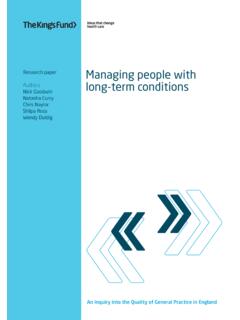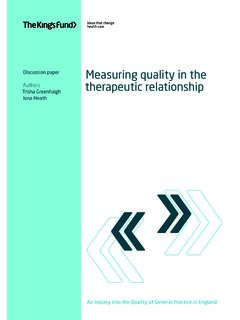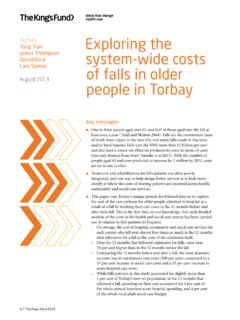Transcription of Long-term conditions Michael Parsonage and mental health
1 1 The King s Fund and Centre for mental health 2012 Long-term conditions and mental healthThe cost of co-morbidities Authors Chris Naylor Michael Parsonage David McDaid Martin Knapp Matt Fossey Amy Galea February 2012 Key messagesn Many people with Long-term physical health conditions also have mental health problems. These can lead to significantly poorer health outcomes and reduced quality of Costs to the health care system are also significant by interacting with and exacerbating physical illness, co-morbid mental health problems raise total health care costs by at least 45 per cent for each person with a Long-term condition and co-morbid mental health This suggests that between 12 per cent and 18 per cent of all NHS expenditure on Long-term conditions is linked to poor mental health and wellbeing between 8 billion and 13 billion in England each year.
2 The more conservative of these figures equates to around 1 in every 8 spent on Long-term People with Long-term conditions and co-morbid mental health problems disproportionately live in deprived areas and have access to fewer resources of all kinds. The interaction between co-morbidities and deprivation makes a significant contribution to generating and maintaining Care for large numbers of people with Long-term conditions could be improved by better integrating mental health support with primary care and chronic disease management programmes, with closer working between mental health specialists and other Collaborative care arrangements between primary care and mental health specialists can improve outcomes with no or limited additional net Innovative forms of liaison psychiatry demonstrate that providing better support for co-morbid mental health needs can reduce physical health care costs in acute Clinical commissioning groups should prioritise integrating mental and physical health care more closely as a key part of their strategies to improve quality and productivity in health Improved support for the emotional.
3 Behavioural and mental health aspects of physical illness could play an important role in helping the NHS to meet the Quality, Innovation, Productivity and Prevention (QIPP) challenge. This will require removal of policy barriers to integration, for example, through redesign of payment with Long-term physical health conditions the most frequent users of health care services commonly experience mental health problems such as depression and anxiety, or dementia in the case of older people. As a result of these co-morbid problems, the prognosis for their Long-term condition and the quality of life they experience can both deteriorate markedly. In addition, the costs of providing care to this group of people are increased as a result of less effective self-care and other complicating factors related to poor mental and social care services in England are not currently organised in a way which supports an integrated response to the dual mental and physical health care needs of patients.
4 The institutional and professional separation of mental and physical health care leads to fragmented approaches in which opportunities to improve quality and efficiency are often missed. Links between mental health professionals and primary care where most people with mental health problems are supported have been neglected in many areas. Increasing sub-specialisation and the decline of generalism in hospital settings can create a lack of co-ordination and oversight of patients multiple needs (Finlay et al 2011).The time is right to explore how patients with combined mental and physical health needs can be supported in a more integrated way. Several recent policy developments in England create an environment in which there are both strong imperatives and opportunities to improve services for this group of The government s mental health outcomes strategy No health Without mental health places considerable emphasis on the connections between mental and physical health , and gives new responsibilities to Improving Access to Psychological Therapy (IAPT) services for supporting the psychological needs of people with Long-term conditions or medically unexplained physical symptoms (Department of health 2011a).
5 N Under the government s reform programme clinical commissioners have a duty to promote integrated services, as do other bodies such as Monitor and the NHS Commissioning Board. A number of clinical commissioning groups are known to have identified mental health as an early priority for service As a result of the Transforming Community Services programme, many mental health trusts have taken on new responsibilities for providing community services for people with physical health problems to a total value of 2 billion. This creates opportunities for developing more integrated ways of The formation of academic health sciences centres, spanning mental health and acute trusts, creates an infrastructure for integrative The QIPP challenge creates an imperative to develop innovative ways of providing health services that deliver better outcomes and more value to patients within constrained King s Fund has previously argued that developing more integrated forms of care for people with co-morbid mental and physical health problems should be one of the top 10 priorities for clinical commissioning groups (Imison et al 2011).
6 This report builds on that argument, presenting the results of a review of research evidence and drawing on examples of innovative practice from within the United Kingdom and internationally. It is aimed at clinical commissioners and others involved in improving the quality and productivity of care for people with Long-term conditions . 2 The King s Fund and Centre for mental health 2012 Long-term conditions and mental healthThe focus of the report is on people with Long-term conditions and co-morbid mental health problems. There are related issues concerning medically unexplained symptoms, the physical health of people with severe mental illnesses, and the impact of substance abuse and alcohol problems on physical and mental health .
7 These issues are not discussed in depth here, but have been addressed elsewhere, both internationally (De Hert et al 2011b) and in the United Kingdom, for example through the work of the Disability Rights Commission (Disability Rights Commission 2006).3 The King s Fund and Centre for mental health 2012 Long-term conditions and mental healthLong-term conditions what are they and how many people do they affect?More than 15 million people in England 30 per cent of the population have one or more Long-term conditions (Department of health 2011c). This includes people with a range of conditions that can be managed but often not cured, such as diabetes, arthritis and asthma, or a number of cardiovascular diseases.
8 To this we can add conditions such as HIV/AIDs and certain cancers, which have not traditionally been considered Long-term conditions but which are increasingly experienced and regarded as such. Many mental health problems can themselves be considered Long-term conditions , but in this paper we use the term Long-term conditions to refer specifically to physical health conditions . Co-morbid mental health problems are commonMental health problems are the largest single source of disability in the United Kingdom, accounting for 23 per cent of the total burden of disease (a composite measure of premature mortality and reduced quality of life ) (Department of health 2011b). Spending on mental health services accounts for 11 per cent of the NHS secondary health care budget (Department of health 2011b), and the full cost to the NHS goes well beyond this as this figure does not include costs to primary care or increased costs elsewhere caused by poor mental health exacerbating other health problems and hindering their treatment.
9 Nor does it take account of the wider economic impact of mental health problems through their effect on employment and workplace productivity (Centre for mental health 2010), or the substantial costs of informal care borne by family members and others (McCrone et al 2008)Research evidence consistently demonstrates that people with Long-term conditions are two to three times more likely to experience mental health problems than the general population. Much of the evidence relates specifically to affective disorders such as depression and anxiety, though co-morbidities are also common in dementia, cognitive decline and some other conditions . There is particularly strong evidence for a close association with cardiovascular diseases, diabetes, chronic obstructive pulmonary disease (COPD) and musculoskeletal disorders (see box overleaf ).
10 There is also evidence for higher than usual levels of mental health problems among people with other conditions , including asthma, arthritis, cancer and HIV/AIDs (Chapman et al 2005; Sederer et al 2006). In addition to the relationship with diagnosable mental health problems, there is an independent association between physical illness and emotional distress (Delahanty et al 2007).4 The King s Fund and Centre for mental health 2012 Long-term conditions and mental healthLong-term conditions such as cardiovascular disease and diabetes are also risk factors for the development of mild cognitive impairment, as well as Alzheimer s disease and vascular dementia (Biessels et al 2006; Velayudhan et al 2010).









